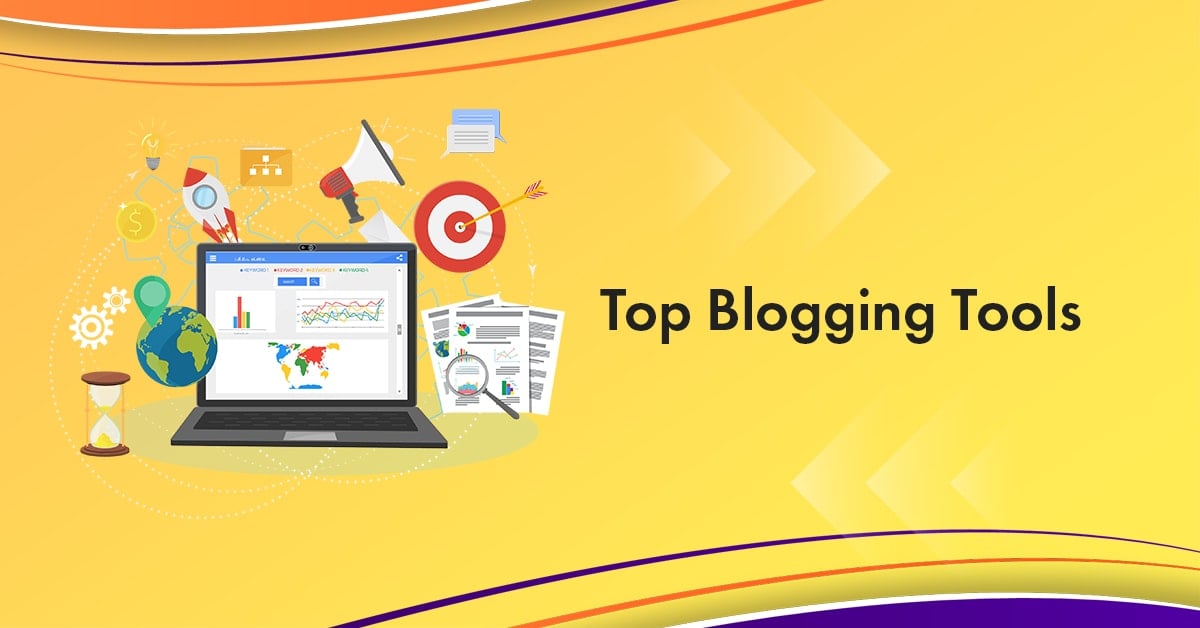Blogging is a vast field – it encompasses a lot beyond just writing. It involves creating high-quality content that is optimized for search engines and promoting it among a broad audience.
Whether you’re a seasoned blogger or just starting, the right tools can make all the difference in streamlining your workflow, boosting your productivity, and improving the overall quality of your blog.
Here’s a list of must-have blogging tools that every blogger should consider using, covering everything from writing to SEO, social media management, and analytics.
1. WordPress
Category: Blogging Platform
WordPress is the most popular blogging platform worldwide, and for good reason. It’s user-friendly, customizable, and highly flexible, allowing bloggers to design their websites with ease. With thousands of plugins and themes available, WordPress is suitable for bloggers at any level.
Key Features:
- Easy-to-use dashboard
- SEO-friendly features with plugins like Yoast SEO
- Customizable themes for unique designs
- Thousands of plugins for additional functionality
- Scalable as your blog grows
2. Grammarly
Category: Writing Assistant
Grammarly is a must-have tool for bloggers who want to ensure their content is error-free. This writing assistant helps you with grammar, punctuation, sentence structure, and even style suggestions. It’s available as a browser extension, so you can use it directly in your blogging platform.
Key Features:
- Grammar and spelling check
- Readability score
- Tone detector
- Vocabulary enhancement suggestions
Why It’s Important: Poor grammar and spelling can hurt your credibility, so using a tool like Grammarly ensures your posts are polished and professional.
3. Yoast SEO
Category: SEO Tool
Yoast SEO is one of the most popular SEO plugins for WordPress. It simplifies the process of optimizing blog posts for search engines, helping you improve visibility and drive traffic to your site. It provides real-time analysis of your content’s SEO performance and gives suggestions for improvements.
Key Features:
- On-page SEO analysis (e.g., keyword optimization, meta descriptions)
- Readability check
- XML sitemap generation
- Internal linking suggestions
Why It’s Important: SEO is crucial for driving organic traffic, and Yoast SEO makes it easier to follow best practices without requiring deep SEO knowledge.
4. Canva
Category: Graphic Design Tool
Visuals play a significant role in blogging, as they make content more engaging and shareable. Canva is an easy-to-use graphic design tool that allows bloggers to create eye-catching images, infographics, social media graphics, and blog post banners.
Key Features:
- Drag-and-drop interface
- Pre-designed templates for blog posts, social media, and more
- Free and paid stock images
- Customizable fonts and colors
- Collaboration features for teams
Why It’s Important: Quality visuals enhance the reader’s experience and are crucial for creating blog posts that are visually appealing and shareable on social media.
5. Hootsuite
Category: Social Media Management Tool
Promoting your blog content on social media is essential for driving traffic to your site. Hootsuite allows bloggers to schedule, manage, and track all their social media posts in one place. With it, you can plan out your entire content calendar and ensure consistency across your social media platforms.
Key Features:
- Social media scheduling for multiple platforms (Twitter, Facebook, Instagram, LinkedIn, etc.)
- Analytics and reporting tools
- Team collaboration features
- Social listening and monitoring
Why It’s Important: Consistent promotion on social media is key to expanding your blog’s reach, and Hootsuite simplifies managing all your accounts in one place.
6. Google Analytics
Category: Analytics Tool
Google Analytics is the go-to tool for tracking website traffic, user behavior, and conversions. It gives bloggers valuable insights into which content performs best, how users find your site, and where they are coming from. This data is vital for optimizing your content strategy.
Key Features:
- Track website traffic and user behavior
- Conversion tracking (e.g., sign-ups, purchases)
- Audience demographics and interests
- Customizable reports and dashboards
Why It’s Important: Understanding your audience and the performance of your content helps you make data-driven decisions and refine your blogging strategy.
7. CoSchedule Headline Analyzer
Category: Content Optimization Tool
Headlines are the first thing readers see, and they play a major role in whether or not someone clicks on your post. The CoSchedule Headline Analyzer evaluates your headlines for length, word choice, and emotional appeal to help you craft irresistible titles.
Key Features:
- Headline scoring system
- Suggestions for improving headline appeal
- Analysis of headline sentiment and power words
- Optimization for SEO
Why It’s Important: A compelling headline is essential for increasing click-through rates, and this tool ensures that your titles are attention-grabbing and effective.
8. Airstory
Category: Writing Tool
Airstory is a tool that helps bloggers write faster by providing a “drag-and-drop” library of pre-written snippets, or “Airstories.” It’s particularly helpful when writing long-form content, as it saves time by allowing you to quickly insert relevant content from previous posts.
Key Features:
- A library of reusable writing snippets
- Save time on repetitive writing tasks
- Organize content for easier writing
- Simple drag-and-drop interface
Why It’s Important: Writing blog posts efficiently is crucial, especially when you’re managing a lot of content. Airstory helps streamline the writing process by reusing your best content.
9. SEMrush
Category: SEO & Competitor Research Tool
SEMrush is an all-in-one SEO tool that provides in-depth analysis of your blog’s SEO performance, competitor research, keyword tracking, and backlink analysis. It helps bloggers identify opportunities for improvement and find content gaps in their niche.
Key Features:
- Keyword research and tracking
- Site audit for SEO health
- Competitor analysis and keyword gap identification
- Backlink analysis
Why It’s Important: Competitive research is essential for growing your blog. SEMrush helps you stay ahead of the competition by uncovering valuable insights and optimizing your content strategy.
10. ConvertKit
Category: Email Marketing Tool
Email marketing is a powerful tool for bloggers to connect with their audience, promote content, and build relationships. ConvertKit is a popular email marketing platform designed specifically for creators and bloggers. It helps you build email lists, create automated email sequences, and segment your audience.
Key Features:
- Simple drag-and-drop email design
- Automation and email sequences
- Audience segmentation for targeted campaigns
- Landing page and form builder
Why It’s Important: Email marketing helps bloggers engage with their audience directly and drive traffic to new posts or products. ConvertKit makes it easier to automate and manage your email campaigns.
Conclusion
These tools are essential for bloggers who want to streamline their processes, enhance their content quality, and grow their audience. From writing assistance to social media management and analytics, the right set of tools can help you work smarter and more efficiently. If you’re serious about taking your blogging game to the next level, these tools are worth incorporating into your blogging toolkit.
Have you used any of these tools before? What’s your favorite blogging tool? Let us know in the comments!

